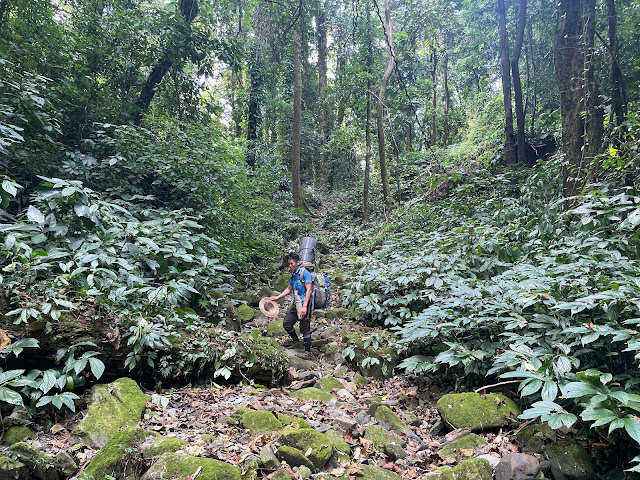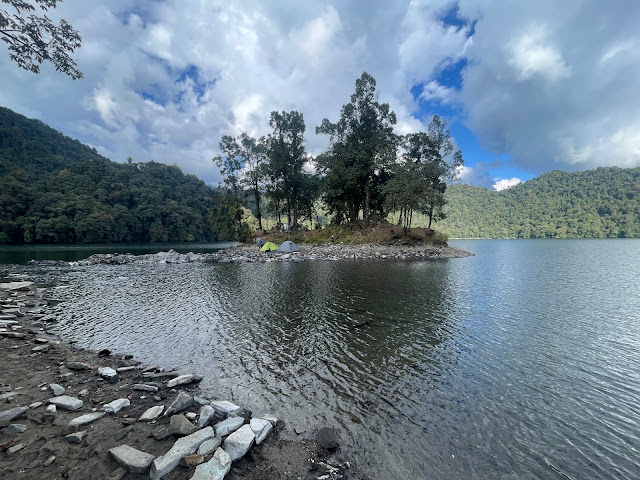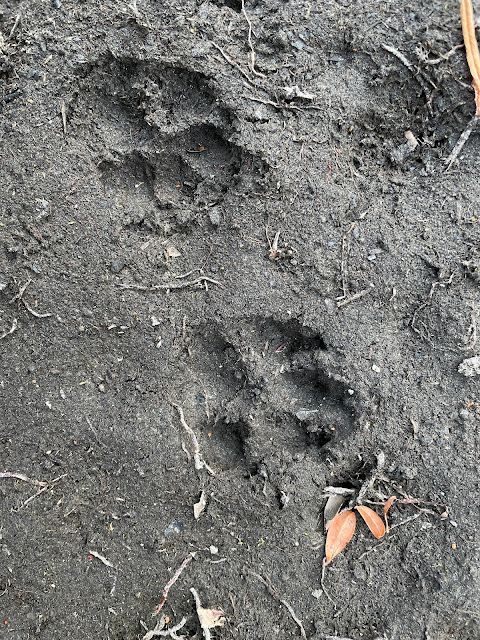Mehao Lake Trek: Trekking in Arunachal Pradesh
“What is the weirdest food you have eaten?” The question I didn’t have exciting answer to, until today...
Arunachal Pradesh is so big and diverse, it’s impossible to cover it even in a months' time, I only had 7 days. While Tawang was my initial choice, despite of all the efforts I could not get satisfactory information on road conditions, stays and most importantly the transport cost. People I spoke to had split opinion on visiting Tawang during winter month of December.
Fortunately, I received response from Karun Roy of Down Lit adventures, and he suggested doing Mehao Lake trek in Mehao Wildlife Sanctuary.
Few weeks, a flight to Dibrugarh and a 4hr drive to Roing later I was ready for the trek.
 |
| Welcome to Roing! |
I met Pemba or Pranav (academic name given by a Bihari teacher) at Roing, we agreed to leave by 7am (by 5 am it’s bright sunlight here in northeast), I would be accompanied by Pemba’s brother Cheng and his cousin Maiko who had done this trek earlier and knew the area well.
 |
| Cheng Mega and Maiko Mega were ready with luggage and their “Eche Pendro” (traditional tribal knife & scabbard). |
We drove for about 2-3 kms away from Roing along the river for as far as the drivable road allowed.
Mehao (pronounced in local language as mee-haa-wee) in Mishmi loosely means a big lake. Locals here believe that this lake was formed after an earthquake in 1950.
We took a small climb along the mountain and continued walking along the Eze (Deopani) river, soon we started gaining height and now we were walking along the water pipeline. This pipeline carries water from Mehao lake to the Roing town.
Even though Northeastern states have some of the wettest places on earth during monsoon, the lower planes still face scarcity of water in winters. Such pipelines carry water from lakes and rivers from higher regions.
After navigating some exposed patches along the pipeline for half a km, we arrived at a under construction road, part of “Development" initiative from the government.
This road continues for next 4.5 kms, leads through some thick forests canopy, it had a lively bird activity.
 |
| Cheng gathering Alanah leaves, just like Banana leaves they will be used as dishes later |
 |
| The walkable road ends at a water stream from the lake, we crossed it and entered the forest area. |
 |
| To ease climb such bamboo routes have been constructed in few tricky spots |
 |
| A steep climb continued for next 2kms , forest slightly opened up after this and we could now see planes of Roing at some distance. We halted for the lunch. |
Fruits from idi boo plant called Idishi were all around us, during winters these fruits ripe and fall down from tree. Hornbill’s love these fruits. Cheng advised that if we are lucky, we might just see a great hornbill.
Idishi fruits looks like a Jamun from outside and Avocado from inside. When raw, has a spicy taste like wasabi which turns sweeter when it ripens more.
These fruits fall at some speed from the trees, Cheng was protected by his traditional bamboo hat Apotalo, me and Maiko were under the threat.
 |
| Cheng with his Apotalo hat |
The ascend got even steeper now, for next 3kms till the lake we were almost climbing a 45 degrees incline.
 |
| Maiko Mega |
This arduous ascend can make this trek not doable in one day for some people.
After almost 6 hours we managed to reach the lake, its expanse and beauty refreshed us immediately.
 |
| deserted forest hut |
 |
| our campsite |
 |
| wood fired tea |
Both Cheng and Maiko are from Idu Mishmi tribe, traditionally a hunting tribe. Throughout the trek we had been talking about Mishmi culture and stories from their childhood mostly around hunts with their parents. We reached the campsite with almost half day to spare so folks offered to show me how they setup traps to hunt the wild mouse.
I could notice how skillful and at ease Cheng and Maiko were in the jungle, be it with use of their blades or knowing how to use bamboo, it was a master class in jungle survival. I was surprised how multi-functional the bamboo is. We needed tong for the hot vessels, there is bamboo, we needed skewers for barbecue, there is bamboo, we needed something to crush tomato, bamboo is at your service. Jungle has answer to all your questions, you need to know what resource to use.
 |
| Setting up the fishing nets left behind by the earlier campers |
 |
| The Cat Prescence |
 |
| Bamboo , if you know how to use it, you can do anything in the jungle |
Mishmi like other tribes are traditionally hunter gatherers, until recently they migrated to planes and turned to farming. Few hundred years ago even rice was not part of their meal. Hence hunting has cultural and social importance. Father would pass on his hunting skills to his sons & daughter, brothers & sisters would hunt together. It's the activity which not only guarantees food on the table, it also binds the entire community together.
However, unlike the perception mainlanders have about these tribes, they are not mindless hunters. The tribe always had strict rules on which animals should be hunted and which should not. Rare animals like hoolock gibbons, cat family and exotic birds are barred from the hunt. If hunted the hunter would be imposed penance. He / she would be banned from attending any public gatherings for 5 days, barred from eating certain food, sexual activities etc. The hunt is to be done for food only, take only what is needed, hunting for the fun of it is avoided.
During our stay at Mehao, we heard many gun shots being fired, many organizations and government initiatives are now creating awareness to prevent hunting. Initiatives like air gun surrender programs are being introduced.
Post dinner we got talking more over rice wine "yuchi". Cheng and Maiko both expressed concern over lack of education and basic health care facilities in the state. While lot has been done to improve the infrastructure in NE, not much has been done to improve the basic facilities, access to education and health care.
This has increased another issue in NE states, most tribes are converting into Christianism. The missionary setup here provides good school and health care facilities. Many foreign funded missions are not dependent on government and hence provide lucrative options if converted to Christianism. Throughout the state I later noticed slogans like " Loss of indigenous faith is loss of indigenous identity"
The culture these tribes have is rare and precious, a true nature worshiper with conservation built in the culture is what the modern world needs the most.
As these tribes do not have a written history, Shaman's of the tribe become the most important person, they are called Igu in Mishmi. They are the ones who know the tradition and their meaning. Igu's pass their knowledge to their successor, but now many younger generations do not want to become Igu and there is a threat that with no Igu's the history and tradition of the tribe will be lost. Many tribal leaders are getting together to start Igu Schools and encouraging local members to continue the traditions.
Cheng soon will join the state teacher's program to become a teacher. He feels a revolution in education system is needed to bring the mainland technical advancements to NE & Arunachal.
While this interesting conversation was going on, we heard a loud thud, one of the mouse traps had gone off, Cheng and Maiko rushed into the jungle to check before the prey is consumed by another predator.
 |
| The catch |
Next morning, we used the recently created porter track to explore the lakes surroundings, it's an almost 8kms walk.
The dinner was traditional vegetable boil and barbequed Brocoli
Next morning post breakfast, we started our descend towards Roing, it took us close to 4hrs to reach Roing. While descending Chega and Maiko made sure to disable all the traps that they had set, " If something gets caught and there is no one to eat it, t will be wasted," said Maiko.
Meeting Tine Meena
In Roing, I had a chance to visit Pemba and Tine's house. Tine is the first NE girl to have scaled mount Everest and definitely one of the coolest persons I met on the trip.
Tine's native place is near Indo- Tibetan border, inaccessible by road, even for regular grocery one has to trek for hours. Tine's father was a disciplined hunter and would often take Tine along, on hunts you carry no bedding, no fire to warm, made Tine tough as a steel. She started working as a porter for Indian Army, dressed up as a boy (girl porters were not allowed back then). She would often get caught but was let go considering her amazing strength.
Later on, Tine led the entire porter's unit on Apothpopo , one of the toughest routes in Arunachal Pradesh. The trek spans for more than 17 days and crosses high altitudes passes. Her ability to lead the group and fight in extreme circumstances impressed one and all. Someone from the army suggested her to take up mountaineering more seriously and that's how she got into Manipur Mountaineering institute.
Before Everest Tine did expeditions like Mt. Shivling and since Everest has been part of 17 different expeditions.
Now mother of 3, She is busy as ever taking care of her beautiful house. Her energy is infectious, hope to see her back in mountains soon.
 |
| Tine and Pemba |
 |
| Pemba's orchid garden has more than 100 varieties of local orchids |
Important Contacts
Karun Roy, Dibrugarh - +91 8787614812
Pemba , Roing , Mishmi Hills Adventures - +919436877955
Cheng, Roing , Mishmi Hills Adventures- +918259800745

















Awesome
ReplyDeleteGreat insights! I really enjoyed reading your post and found it very informative. Looking forward to more such interesting content. If you're interested in exploring Port Blair, click below link.
ReplyDeletePort Blair Tour Packages
Absolutely loved this post! If you're planning a dream vacation, Seabeach Delight is your one-stop destination for the best Andaman Nicobar package for family. Whether you're seeking relaxation or adventure, they offer customized Andaman and Nicobar tour packages that suit every traveler's needs. Couples looking for romantic escapes will love their Andaman tour packages for couple, and if you prefer to book your own stay, check out their flexible Andaman tour package without hotel. For honeymooners, the honeymoon tour packages in Andaman promise unforgettable memories. Call +91-9679597659 or +91-7063995196 to book your ideal getaway today!
ReplyDelete